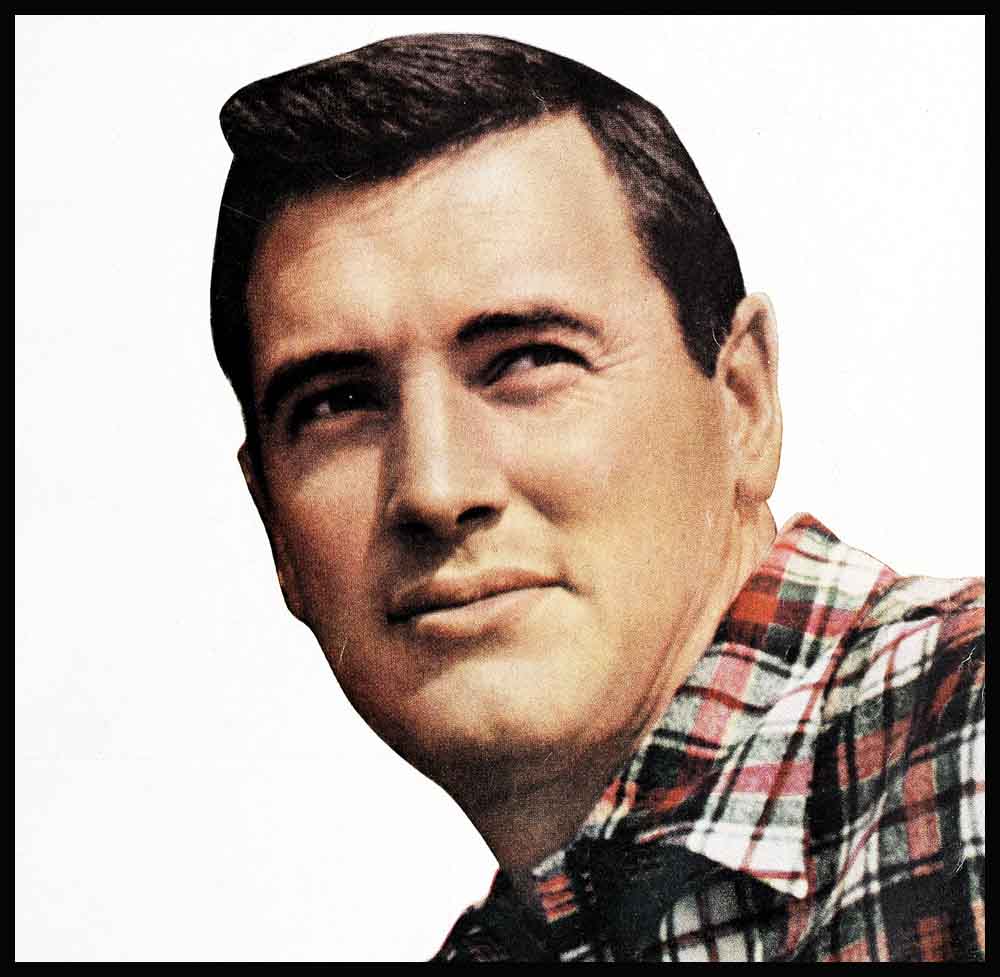
The Rock Hudson Story
PART I
At Lackland Air Force Base in San Antonio, Texas, a WAF sergeant paused while sorting the day’s mail, to shout, “It’s here, girls!” Four WAFS clustered excitedly around to examine the letter she held, then discreetly disappeared while the sergeant delivered it to a tearful recruit lying face down on her cot in the barracks. It took a little while for the girl to realize what the sergeant was trying to tell her, and even longer to believe it. When the message finally got through to her, she sat bolt upright, reached for the proffered letter, and looked, un-believingly, at the name on the upper left rim of the envelope—Rock Hudson. still unconvinced, she gently opened the letter and slowly read it. Then she read it again. It was Rock’s response to an “emergency telegram” sent by her barracks-mates, who had wired Rock, “A letter from you would make her feel like a woman again, and not just another soldier.”
AUDIO BOOK
The letter served its purpose.
In Boston, Massachusetts, a grateful father recently contributed $200 to the Crippled Children’s League in Rock Hudson’s name, as thanks for an autograph sent to his eleven-year-old daughter who is suffering from leukemia. “My daughter is the happiest girl in the community and the envy of all her friends,” wrote the father. “Your picture worked better than any medicine.”
A thirty-four-year-old woman in Blackburn, England, wrote to Rock Hudson: “I can sew, cook, knit, darn, typewrite, milk certain cows, speak French, dive from low heights, cycle about eighty miles a day without being in practice, and also do plain, but not fancy, ice-skating. I’d be the perfect wife for you.”
The mother of two girls, ages nine and thirteen, wrote from Macomb, Illinois, that she is so in love with Rock Hudson, she is about to burst. “My husband would kill me if he knew,” she said. “I am saving money from my shopping budget to buy you cufflinks for Christmas.”
And a grandmother in Chattanooga, Tennessee, writes to Rock every morning while having her second cup of coffee to tell him what her children and grandchildren are doing and keep him up to date with the family.
These women have only one thing in common: They are Rock Hudson fans.
Most film-star fan mail is unbelievably boring. The fan is usually struck dumb by such personal contact with his idol. In contrast, the eight to ten thousand letters a month sent to Rock Hudson are unique because the writer invariably feels the recipient is a friend.
Unlike Rudolph Valentino, who was the sex-boat of his day, Rock Hudson is not the lover type. He has sex appeal, but his older fans want to mother him. Young girls want to marry him, and men want to emulate him.

He seems to appeal to all ages and types. Moviegoers, asked to analyze Rock from his screen impression, agreed on many points, such as: He gives the appearance of great solidity; he seems well educated and poised; obviously, he comes from a wealthy family; his calm good-nature could come only from a well-ordered life; if anything, he appears spoiled—probably had everything easy.
Nothing could be further from the truth.
Rock Hudson’s life has been complicated and difficult, uncommon only because it was so common. A detailed study of it shows him emerging as a stronger, more complex person than anyone realizes. It dissipates completely the image of “the beautiful hunk of man” which has been built up through years of fan-magazine stories and “beefcake” poses.
Now, when Rock has finally been given a chance, in “Giant,” to prove what a competent actor he has become, it is time to strip away the superficial image of Rock Hudson and see him as he really is—a solid, stable, intelligent young man who has built up an almost uncanny ability to take life as it comes and make not only the best but the most of it. By the time his next two important pictures, “Something of Value” and “Battle Hymn,” are released, Rock will have left behind for good the boy-next-door roles, although in real life he is closer to being the “boy next door” than any actor in Hollywood.
The real story of Rock Hudson began at 2 A.M. on the cold, wind-bitten morning of November 17, 1925, when a long, thin and small (5% pounds, 22 inches long) baby boy was born to Kay and Roy Scherer of Winnetka, Illinois.
Kay Scherer, Rock’s mother, was a handsome, dark-haired woman with the fun-loving temperament and good humor of the Irish as well as an English reverence for thrift and industry. Even now Rock closely resembles his mother in his habits, though not in looks. He has her habit of closely studying everyone with whom he talks, and he has inherited from his mother her quiet appearance of emotional solidity and stability.
From his German-Swiss father, Rock, who was tagged Junior at birth and later christened Roy, inherited tall, dark good looks and a relaxed and easygoing temperament.
As a child Rock was a shy, almost too-pretty boy with long, dark curls that weren’t cut until after his fourth birthday, at the time his parents were divorced. Whether or not this had any traumatic effect on Rock’s personal life or his career is something for the psychiatrists to give an opinion on. But it still remains that Rock was scarred by the divorce, and for years, he blamed himself for the fact that his father, with whom he was very close, deserted him and his mother.
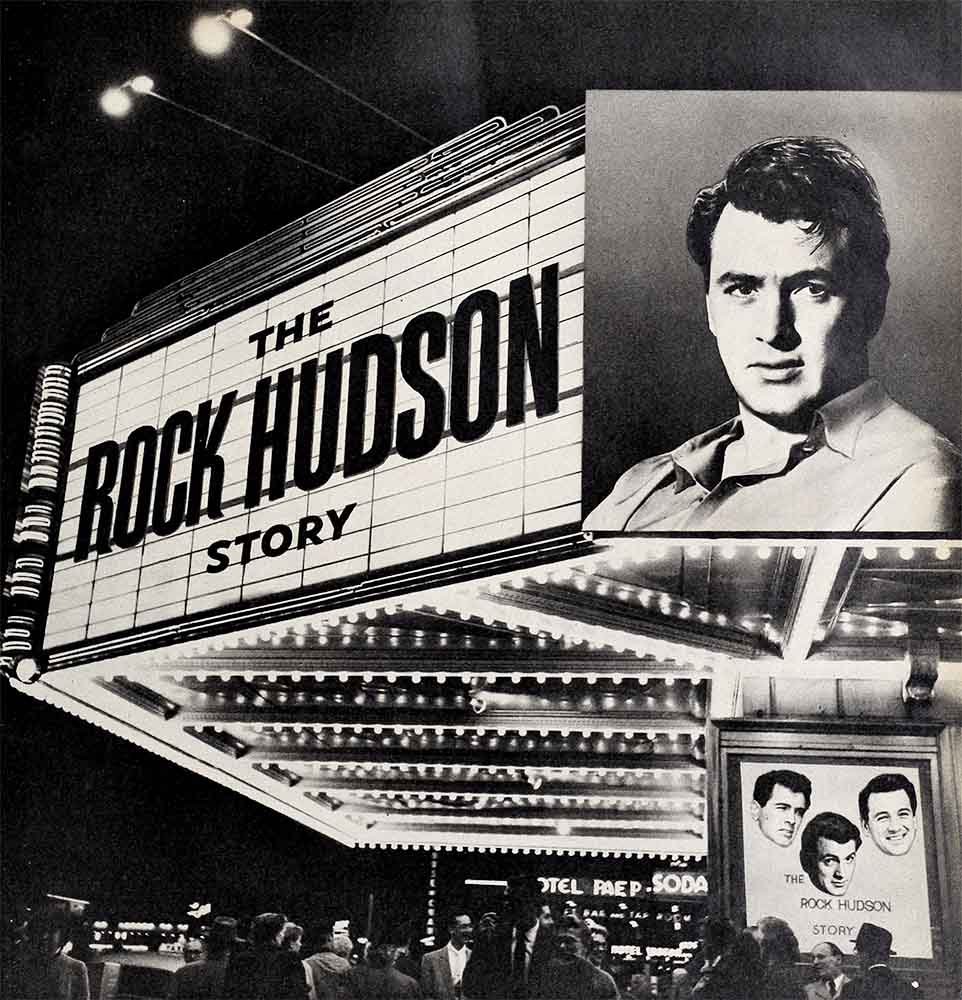
“I had to take over then,” his mother says. “I always took him with me and tried to be a father as well as a sister and brother to him.”
Mrs. Scherer got a job as a switchboard operator and she and Rock moved in with her parents, who were also sharing their roof with another daughter, her husband and their four children.
Even as a toddler Rock began to learn the meaning of responsibility, and how to assume it cheerfully. He helped his mother clean house and cook. once when she was ill with a cold, he offered to make orange juice for her. He disappeared into the kitchen. When minutes passed and Rock didn’t reappear, his mother went to investigate. She found him squeezing oranges—by the dozen!
“He had every pitcher and pan in the house filled with juice,” his mother recalled. “He’d squeezed five dozen and had only one to go. I’d asked for juice and he was going to give it to me—by the barrelful.”
In 1932, when Rock was seven, his mother married Wallace Fitzgerald, a Marine Corps officer who adopted Rock and gave him his legal name of Roy Fitzgerald. But the marriage was a stormy one, destined to end in another divorce.
It’s ironic that Rock, who never had a father of his own to look up to and admire, is now considered by many of his fans to be the perfect husband-father type. Rock refuses to discuss his fathers—he had three in all, his own father and two stepfathers—and says simply, “Regardless of whatever else happened, I knew my mother loved me.”
Rock and his mother were poor, but he never went without food or clothing. He learned at an early age, however, that he was the “man of the family” and was therefore expected to contribute. When he was twelve, he started doing odd jobs and worked as a soda jerk, window-washer and even as a short-order cook. He worked at anything available after school and on Saturdays. Sundays were spent caddying for pay, of course, at the local golf course and country clubs.
Rock ’s mother, whose name is now Mrs. Olsen, recalls that she rarely spanked him as a child. One incident that sticks out in her mind is the day she told him to walk next to her and he ran ahead and was almost hit by a car coming out of a driveway. She was too angry and frightened to do anything other than say he was very dumb.
“I found that that word hurt him more than any spanking,” she said. “Rock was a proud boy, and a good one. He worked hard and I wanted him to have fun just as long as he didn’t disgrace his parents. I always taught him to be well-mannered and considerate of other people besides himself, and I think the teaching rubbed off on him.”
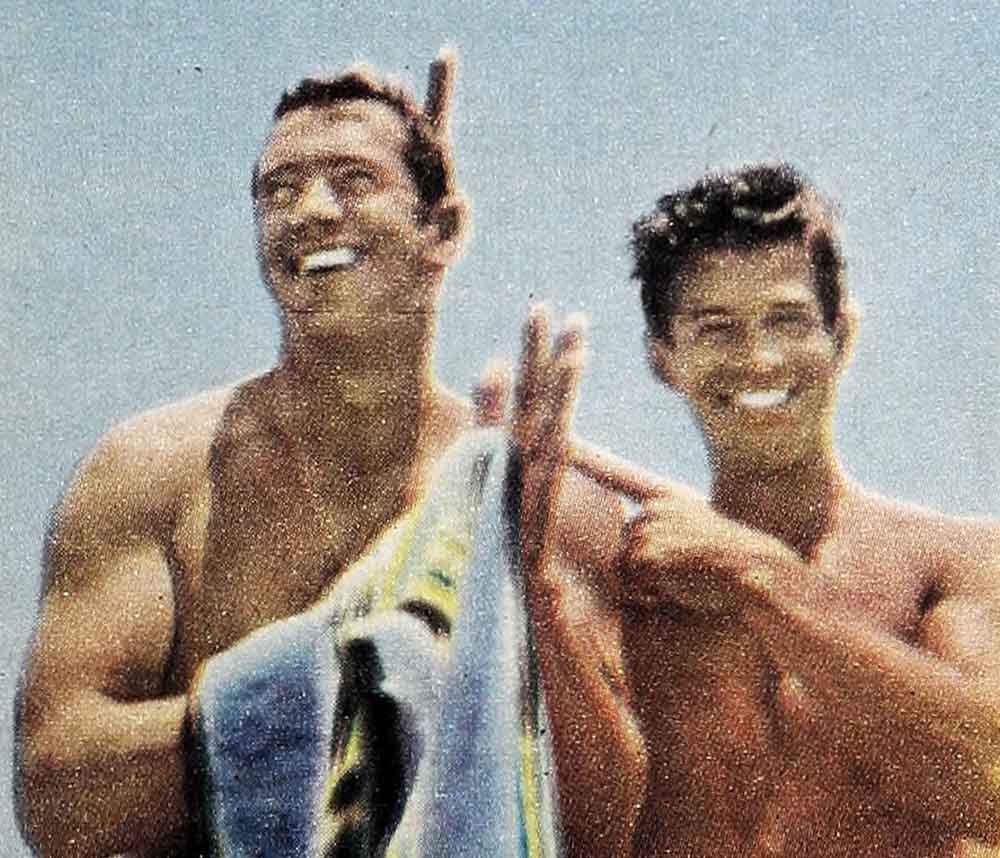
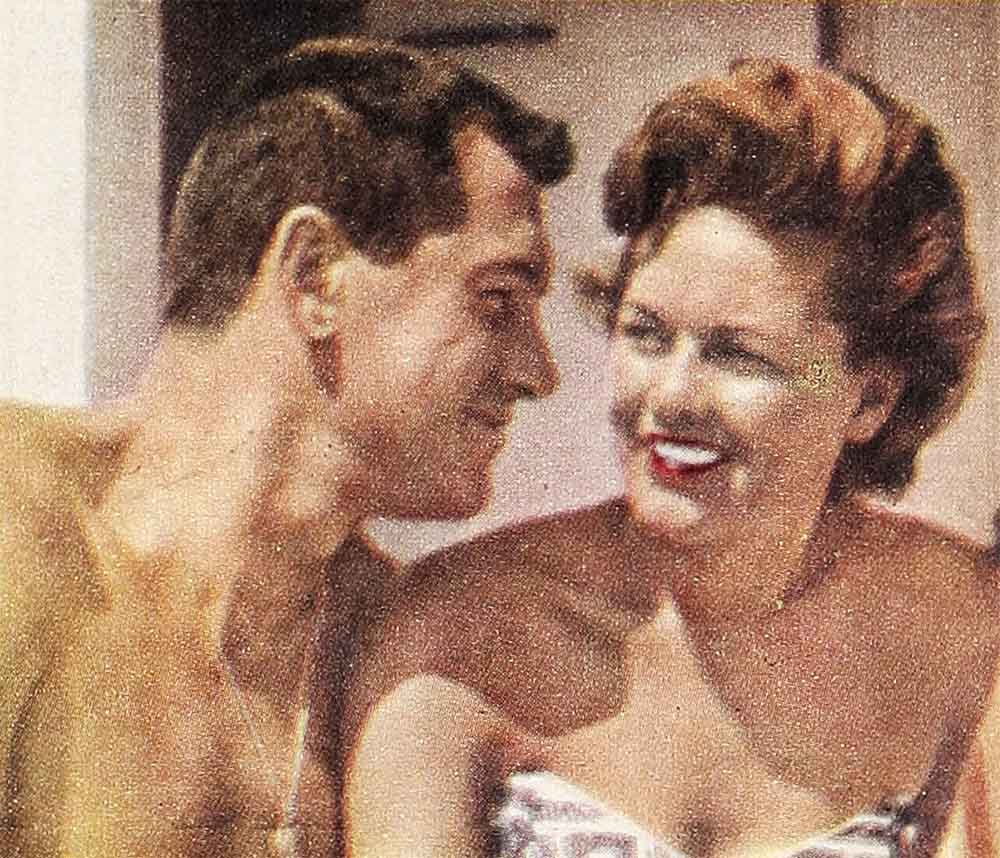
It was when he was twelve that Rock first decided to become an actor. He and Jim Matteoni went to see Jon Hail in “Hurricane.” As Rock sat in the darkened theatre watching Hail dive into the water and swim to Dorothy Lamour’s side, he imagined himself as Hall.
The chances are that thousands of young boys seeing that picture—or any picture—imagined themselves as the hero. But Rock kept his imaginary picture alive in his mind and, when he thought of his future as a man, secretly planned to become an actor.
Once he told his mother of his ambition. She accepted his announcement with a smile and an encouraging word. Rock had gone through the policeman, detective and ship-captain stage, and she imagined he would get safely through the acting stage, too.
Thanks to the time spent at his grandparents’ home, Rock was never without playmates, although he was lonely for a real family life. Most of his close friends came from families with good relationships, and there is no doubt that Rock secretly envied them.
For example, he spent a great deal of time visiting Jim Matteoni, a stocky youngster of Italian descent who is now a music teacher. The Matteonis gave Rock the family feeling he felt lacking in his own home, and Jim’s family became his.
Jim and Rock went to New Trier High School, in Winnetka, along with 700 other North Shore children, most of whom were from wealthy families and enjoyed every luxury. Rock recalls himself as a “typical high school adolescent” and says he was unaware at the time of feeling very much “different” from his financially well-to-do friends.
Dean of boys Frederick Kahler of New Trier remembers him as a “nice, quiet boy who never gave anybody cause for concern. He was never in any trouble.” But he was not an outstanding student. Although his IQ was high Rock didn’t like to study, and he was beginning to find out about girls.
Gigi Peterson, who had a Spanish class with Rock, remembers him as a “cute boy” whom she had a crush on. “I was a little better in Spanish than he was,” said Gigi, “so I used to let him copy from my papers. I got As and he got Bs.”
Some of the other girls at school remember Rock as good-looking but skinny and awkward. One of them said he was “just around. He never asserted himself.”
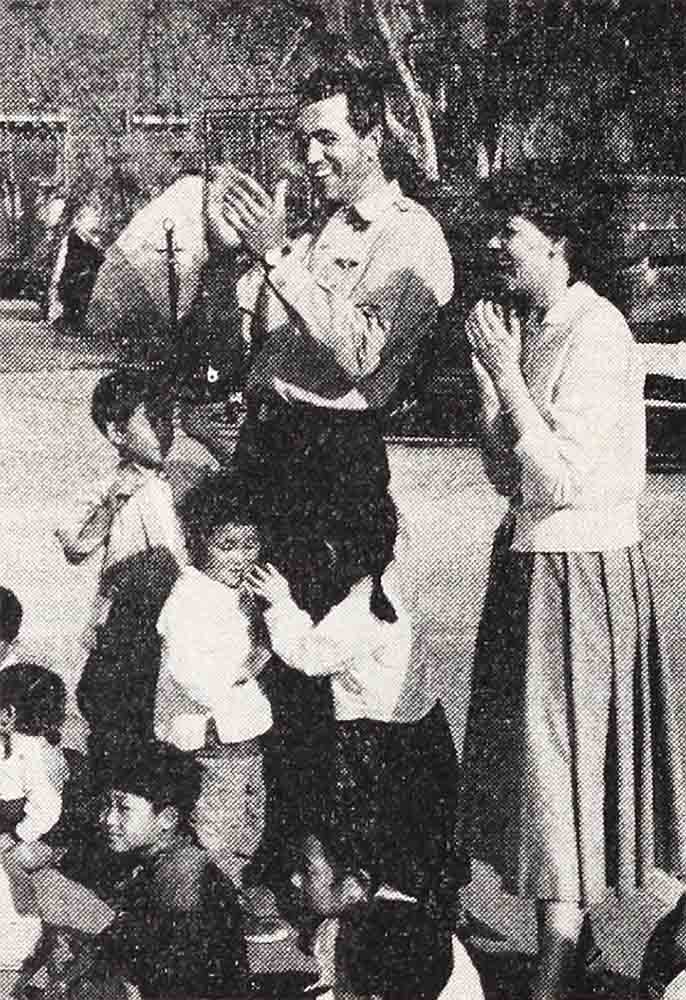
Rock took a regular non-college curriculum, including three years of various business courses and a year and a half of industrial arts. During his freshman year at New Trier he wanted to be a draftsman, but by his junior year he decided to become a bookkeeper and accountant, although he still nursed his dream of someday being a movie star. However, it was a dream so farfetched as to seem almost fantastic, so Rock mentioned it to no one, except for his mother, while he ground away at mathematics and double entries.
Nancy Gillogly, who was his steady date throughout high school, recalls that he didn’t seem to have any particular ambition. Like most young boys his age he was merely “putting in time” until school was finished and he could go out on his own. He didn’t consider college because he never believed he would be able to afford it.
He held outside jobs all through high school and was unable to participate in many extra-curricular activities. He played baseball occasionally and swam in inter-class competitions, winning some medals he is still proud of.
For a while during his senior year, Rock worked for an awning company. At the same time Jim Matteoni and another friend were working for a laundry doing home deliveries. The three boys decided to pool their work, the other two helping Rock with his tasks and he in turn helping them with their job. This happy arrangement was shortlived. Rock was fired from the awning job after he forgot to label some awnings, resulting in incredible confusion at the plant.
Rock accepted the news of his dismissal with the same good-natured humor that today seems to characterize him on-screen. Somehow he had learned the magic of laughing at himself—a trick he has never forgotten. He also learned to take things in stride. Rock is and always has been a stranger to worry and anxiety.
He had a reputation through high school as a one-woman guy—Nancy’s—and although some of his female classmates say they would like to have dated him, it was generally known that he was “taken.”
Usually, he and Jim double-dated. Their pattern of dates was always the same: a drive around town in any automobile that happened to be available, followed by Cokes at the local candy store. Their favorite car was an ancient Model A Ford convertible that originally cost sixteen dollars but had a thirty-dollar top. On weekends they all went to dances at the Winnetka Country Club or at school.
Despite his size—Rock was almost six foot, three inches in high school—he was an excellent and tireless jitterbug dancer. Nancy, who is a petite brunette, recalls that her head used to ache from looking up at him when they danced but, she says nostalgically, “he sure was a dreamy dancer!”
It was Rock’s aptitude for dancing that was responsible for his becoming a gigolo before he left high school. As a gag, he and Jim Matteoni answered an ad for young men who wished to earn fifty cents an evening by dancing with young students in a dancing class in Evanston. For four months they commuted to Evanston on weekends regularly, much to the anger of their dates at home.
During free afternoons, Rock and Jim scouted all the record shops searching for bargains in jazz and boogie-woogie records. Even as a child Rock had been interested in music and spent hours picking out tunes on the piano with one finger. Later, he became a good “by ear” pianist. When he reached high school he and Jim invested in a wind-up phonograph.
While the boys were searching for collectors’ items they cut a record that is now a collector’s item of its own. The record, made in a dingy shop on the South Side of Chicago, features “Jim Matteoni on piano with Roy Fitzgerald.” While Jim played the piano Rock talk-sang two stories, one about a racehorse and the other about a baboon.
Now that he finally has the money to indulge his taste, Rock has a fabulous record collection. But he still remembers the days when he had to scrimp and save to buy one record. Only two years ago he told Jim Matteoni that he had finally obtained a record of “Green Gin,” by Ernie Andrews, that he had wanted since his teens.
In addition to being fond of records Rock was also fond of food. At the Sweet Shoppe, a high-school hangout in Winnetka, proprietor Peter Poulos remembers Rock as a nice quiet guy who used to come in almost every afternoon for a chicken-salad sandwich and a hot-fudge sundae with pecans—lots of pecans.
Thanks to plenty of food and hard work, Rock developed into a solidly muscled young man who was especially gentle because of his size.
At eighteen, when he was graduated from high school, Rock was drafted into the Navy. For a while he was stationed at Glenview Naval Air Base, just outside Chicago. He was near enough to go home for weekends. On one visit he contracted pleurisy and, in the excitement of his illness, his mother forgot to notify the air base. Rock was officially listed as AWOL until the matter was straightened out.
While Rock was in the service he wrote occasionally to Nancy Gillogly. When she graduated from high school he wired his mother to “buy Nancy a dozen red roses.” Mrs. Fitzgerald bought the roses and wrote to Rock that “Nancy Drake loved your gift.”
In a panic, Rock wired back that “the wrong Nancy” got the roses and, for heaven’s sake, to set things straight. Mrs. Fitzgerald bought a charm bracelet for the right Nancy, who still has it, along with a picture of Rock in his uniform, inscribed “All My Love, Roy,” and a hula skirt which he sent from Honolulu.
Rock eventually landed in the Philippine Islands, where he worked on fighter planes. When the war was over he was transferred to bombers. One morning, while checking out a big bomber, he accelerated both motors on the same side of the plane at once—a near-fatal mistake.
The plane jumped off of the blocks holding its front wheels and before Rock could bring it to a halt had chopped a smaller plane into kindling. The next day Rock was transferred to the laundry detail.
He accepted the transfer with good grace. “It was the best job in the Navy,” he says. “The cooks have to have their clothes white and washed all the time. So you tell ’em, if they want good service, they better ante up the good food. You get it! For taking care of their uniforms, officers give you liquor which you can resell at a neat profit. And you can make an easy forty or fifty bucks a week just by going through the pockets of dirty uniforms.”
After two years of service, Rock returned to Winnetka. He was at loose ends. As he put it, “I wanted to loaf around a while, see my friends, date the girls and have a good time.”
He drew twenty dollars a week from the government and did as little work as necessary to keep him going for a year. When his GI allotment ran out he got a job with the post office.
Rock’s postal route took him down West Cherry Street, a pleasant tree-shaded suburban Street in a nice residential district. People on the route still recall him. Mrs. Augdahl, whom he called “Mom,” had a house at the end of Rock’s route; almost every day he stopped in for coffee and doughnuts and to rest his feet. Mrs. Augdahl went to Hollywood for the This Is Your Life TV show featuring Rock and afterwards said, “He hasn’t changed at all. He’s still the same now as he was when he was a postman.”
Arthur Klopher, who was postmaster in Winnetka at the time, says, “When Rock worked for me, he was always on the job. He was a very determined fellow. His family wasn’t in a very good way, financially, and he made it on his own.”
Rock, who scored a 96 on his Civil Service exam, was eligible for a promotion just a few weeks after he left for California with his mother. The plan originally was for Rock to go to the University of Southern California while his mother worked for the telephone company in Pasadena. However, Rock’s high school grades were not high enough for him to enter the University, so he got a sixty-dollar-a-week job as a truck driver for the Budget Packing Company, delivering dried beans to grocery stores. Meanwhile, he was working toward his secret ambition—to become an actor.
To save money he looked up his father, Roy Scherer, in Long Beach, where he owned an electric appliance store, and stayed with him. Although Rock’s father left his mother, the parents remained friendly (in the Hollywood tradition) over the years. Also, Rock spent many summers with his paternal grandparents and he and his Dad regularly corresponded with each other.
One night Rock approached his father on the subject of actors and acting.
“Dad grunted like he’d been hit in the stomach,” Rock says. “He said not to mention actors to him. He considered them unreliable and unstable.”
He soon moved out of his father’s home and got a room in a family hotel with three other drivers. One of them had a friend who knew an agent named Henry Willson, who was in charge of talent for David O. Selznick.
Rock arranged for an interview with Willson and had five pictures of himself taken by a photographer whom he chose from the classified ads. He borrowed twenty-five dollars to pay the photographer and worked three days to repay the loan.
On the day he went to see Willson for the first time, Rock says his “knees were knocking like a pair of maracas and my throat felt like sandpaper.”
When Willson asked Rock if he could act, Rock told the truth, “No.” He figured the interview was then at an end.
“Good,” answered Willson. “I think I can do something for you.”
Willson saw in Rock the moviegoers’ ideal of a typical American boy. “He had size, good looks, strength and a certain shyness that I felt would make him a star like Gable,” says the agent. “He has the kind of personal charm that makes you think you’d enjoy sitting down and spending time with him.”
Willson took Rock to leading executives at his studio, none of whom would give him a screen test. “Bring him back when he’s ready,” they said. So Willson proceeded to get him “ready.”
For three hours a week, Rock took lessons from diction coach Lester Luther, at twenty-five dollars an hour, paid by Willson. Rock also took dramatic lessons every night—after working all day as a truck driver. He kept the job because he was never as certain as Willson was that he had the stuff stars are made of.
Fighting traffic and toting bales of beans all day left Rock tired and tense by the time he arrived for his dramatic lessons. So his instructor, Florence Cunningham, taught him a trick which he still uses to relax: He would envisage a small white pearl on a piece of black velvet and, while concentrating on it, recite the alphabet.
He had a lot of trouble getting rid of his nasal, Mid-western twang, but finally, where training had failed nature took over. He caught cold. After a long siege he came down with laryngitis. When it was over he found the racking cough had left his voice deep and resonant.
After more than a year of lessons and hard work, Rock was “ready,” in Willson’s estimation. The final step was to give him a new name.
Willson is famous in Hollywood for having discovered—and named—Tab Hunter and Race Gentry. He didn’t like the length of “Fitzgerald,” which Rock was then using. So he selected the name of a car for a last name and suggested Rock add his own first name. After some deliberation Rock changed Roy to Rock.
Having supplied him with a new voice, a new name and some dramatic instruction, Willson again took his discovery out for inspection. First stop was the offices of Raoul Walsh, the film director who had had good experience with truck drivers. He had taken another man off a truck and turned him into John Wayne.
Walsh looked Rock over with a practiced eye. “Green,” he said to Willson, “but juicy. Even if he can’t do anything he’ll be pretty scenery.”
Walsh signed Rock to a personal contract at $125 a week and put him in “Fighter Squadron.” In his first film Rock had only one line, “You’d better get a bigger blackboard.” It took him thirty-four trys to say the line right.
By then Willson was on his own, as an independent agent. He believed the best studio for Rock would be Universal-International. For weeks Rock worked on the scene that was to be his test for the studio. On the night before the test he worked with Walsh, then went to the studio, only to find he had brought the wrong script.
After the test Rock had a discouraging interview with producer Walter Wanger. It seemed to go wrong from the beginning. Discouraged and miserable, he went back to his rooming house convinced that he would be a truck driver for life.
On his way up to his room he remembered a little old lady on the ground floor who had had a stroke. Rock had been in the habit of reading the comics to her every afternoon, and telling her all about his day on the truck or at the studio.
She, in turn, was his first fan. She had seen “Fighter Squadron” six times before her stroke. That night she asked him how the interview with Wanger had gone.
“I was about to tell her the truth,” says Rock. “But then I decided not to. Instead I said everything was wonderful and that I was sure to have my name in lights, with her as my chief advisor. Then I went on and read to her. Suddenly she began to jerk convulsively and within a few minutes she was dead.”
As he sat there, holding the old lady, Rock was glad he had lied to her, that he had made her happy, thinking things were beginning for him. “Just then,” he recalls, “the telephone rang. It was Henry. U-I was going to sign me to a contract. Suddenly, I felt strange. I thought of the little old lady on the ground floor and what I had told her. And I wondered.”
Rock’s life at Universal-International was far from easy. The studio had paid off more than $9,000 invested in him by Willson and Walsh and they were determined to improve on their investment. They felt Rock had the raw material stars are made of. It was their job to shape him into a box-office figure.
Every morning he reported to the studio at eight and began a day which he later said was harder than driving a truck. As a star student at the studio’s drama school he was coached in everything from acting, to fencing; to riding; and literally pummeled, pushed, and punched into shape by Franie Van, the studio’s athletic director. If he found Rock slouching, Van would slap him smartly on the back. Van had a one-hundred-dollar bet that he could break Rock’s slouch habit. He was determined to win it—and he did.
During this time Rock was considered just another actor in Hollywood. The only magazine cover he appeared on was a comic book. Finally, after a year in which he never appeared before a camera, Rock was again judged “ready” by drama coach Sophie Rosenstein.
He was given bit parts in dozens of films. During four years he appeared in more than thirty-five pictures, and at one time worked for five straight months without a day off. But he loved it. “I asked for work when I signed up,” he says. ‘T got it and it paid off, so I had nothing to complain about.”
One of the many pictures he worked on was a Western, and Rock had trouble with his first riding part. Every time the cameras began to roll and he began to ride, his ten-gallon hat fell off. The scene was tried more than half-a-dozen times. And each time it became more and more embarrassing for him.
Rock was mortified and, as often happens, completely unable to do the scene because he was so acutely aware that everyone was watching him. The tension was finally broken when someone among the crowd of watchers started to laugh. It was such an infectious giggle that it broke up everyone, including Rock, who immediately became relaxed.
The giggle came from blonde Betty Abbott, who was the script girl on the picture. When Rock searched her out later he began a friendship which was to continue through most of his early years in Hollywood.
As a bachelor Rock was linked romantically with scores of girls. At first his studio wanted him to date young and better-known stars in the hope that he would make the fan magazines and newspapers. So for a while he dated Vera-Ellen almost exclusively. Their romance was studio-inspired at first, then became more serious, until finally it became a question of whose career would be more important in a marriage. Vera-Ellen didn’t want to give up hers and Rock was just starting. They decided to wait.
“We were both serious about marriage for a while, then decided we weren’t ready for marriage—yet,” says Rock, explaining why the romance ended.
Meanwhile, Rock’s career began to gather momentum and he began to be seen in the right places with the right people. One of these was Rocky Cooper, Gary’s wife, who needed an escort for an important party. Rock was suggested and escorted Mrs. Cooper to the event on a Friday night. That casual appearance was to have important aftermaths for Rock and was a turning point in his career.
It is a quote. PHOTOPLAY MAGAZINE FEBRUARY 1957
AUDIO BOOK




